Index relies entirely on the support of donors and readers to do its work.
Help us keep amplifying censored voices today.
[vc_row full_width=”stretch_row_content_no_spaces” full_height=”yes” content_placement=”middle” css_animation=”fadeIn” css=”.vc_custom_1521806157541{margin-top: 0px !important;background-image: url(https://www.indexoncensorship.org/wp-content/uploads/2018/03/MMF_2017_web-cover.jpg?id=98589) !important;background-position: center !important;background-repeat: no-repeat !important;background-size: contain !important;}”][vc_column][/vc_column][/vc_row][vc_row css_animation=”fadeIn” css=”.vc_custom_1521805928920{margin-top: 0px !important;}”][vc_column][vc_row_inner][vc_column_inner][vc_column_text]
[/vc_column_text][/vc_column_inner][/vc_row_inner][/vc_column][/vc_row][vc_row equal_height=”yes”][vc_column][vc_custom_heading text=”Deaths” use_theme_fonts=”yes”][vc_column_text]
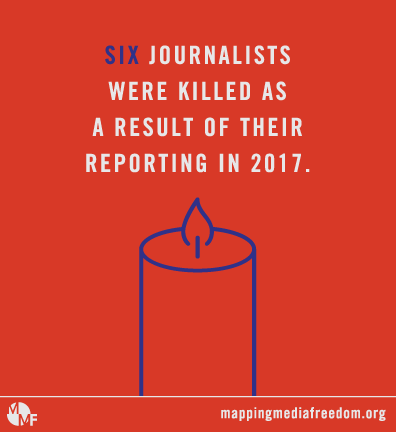 Six journalists were killed as a result of their reporting in 2017.
Six journalists were killed as a result of their reporting in 2017. [/vc_column_text][/vc_column][/vc_row][vc_row][vc_column][vc_custom_heading text=”Physical assaults and injury” use_theme_fonts=”yes”][vc_column_text]
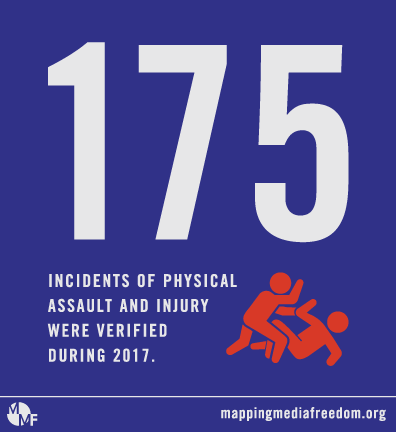 Mapping Media Freedom documented 175 verified incidents of assault and injury, 109 of which occurred in just five countries: Russia (47), Spain (19), Ukraine (18), Italy (15) and France (10).
Mapping Media Freedom documented 175 verified incidents of assault and injury, 109 of which occurred in just five countries: Russia (47), Spain (19), Ukraine (18), Italy (15) and France (10). [/vc_column_text][vc_custom_heading text=”Arrests/Detainments” use_theme_fonts=”yes”][vc_column_text]
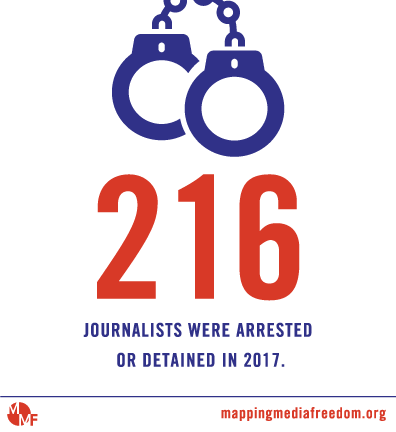 A total of 216 journalists were arrested or detained in 2017, including 21 in Azerbaijan. On 5 July Afgan Mukhtarli was kidnapped from Georgia, where he had lived in self-imposed exile for three years, and taken to Azerbaijan. While in prison, he suffered serious health problems and lost a significant amount of weight. In January 2018 he was sentenced to six years in prison by an Azerbaijani court.
A total of 216 journalists were arrested or detained in 2017, including 21 in Azerbaijan. On 5 July Afgan Mukhtarli was kidnapped from Georgia, where he had lived in self-imposed exile for three years, and taken to Azerbaijan. While in prison, he suffered serious health problems and lost a significant amount of weight. In January 2018 he was sentenced to six years in prison by an Azerbaijani court. [/vc_column_text][vc_custom_heading text=”Criminal charges/civil lawsuits” use_theme_fonts=”yes”][vc_column_text]
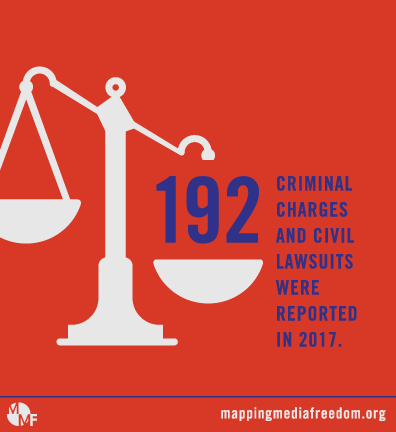 There were 192 cases of criminal charges or civil litigation reported to Mapping Media Freedom in 2017. In Italy, lawsuits demanding millions of euros in damages were filed throughout the year. In March Claudio Riva, former owner of the steelworks company Ilva, sued newspaper Gazzetta del Mezzogiorno for €2.2 million in damages, for publishing an article about pollution allegedly linked to the company’s operations in Taranto. Riva’s lawyers asked for €550,000 in compensation for each of the four damaged parties: Riva Forni Elettrici SPA, Claudio Riva, Fabio Arturo Riva and Nicola Riva. In October Il Locale News was sued for €1 million by Giancarlo Guarrera, an engineer and director of Airgest, the company that manages Trapani airport in Sicily. On 8 November 2016 Il Locale News featured an article on financial issues at Airgest.
There were 192 cases of criminal charges or civil litigation reported to Mapping Media Freedom in 2017. In Italy, lawsuits demanding millions of euros in damages were filed throughout the year. In March Claudio Riva, former owner of the steelworks company Ilva, sued newspaper Gazzetta del Mezzogiorno for €2.2 million in damages, for publishing an article about pollution allegedly linked to the company’s operations in Taranto. Riva’s lawyers asked for €550,000 in compensation for each of the four damaged parties: Riva Forni Elettrici SPA, Claudio Riva, Fabio Arturo Riva and Nicola Riva. In October Il Locale News was sued for €1 million by Giancarlo Guarrera, an engineer and director of Airgest, the company that manages Trapani airport in Sicily. On 8 November 2016 Il Locale News featured an article on financial issues at Airgest. [/vc_column_text][vc_custom_heading text=”Legal measures” use_theme_fonts=”yes”][vc_column_text]
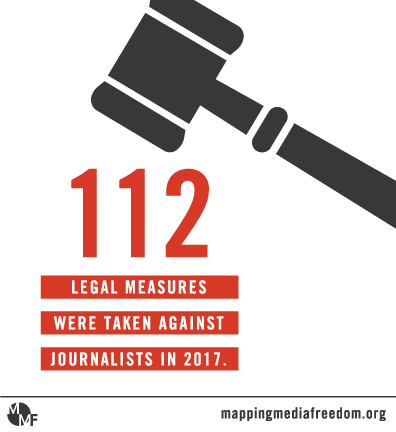 There were 112 legal measures taken against journalists in 2017. In the United Kingdom, the offshore company Appleby, which was at the heart of the Panama Papers scandal, launched breach of confidence proceedings against the Guardian and the BBC on 18 December, in an attempt to force them to disclose the documents used in the investigation. Appleby said the documents were stolen in a cyberattack and there was no public interest in the revealing of their contents.
There were 112 legal measures taken against journalists in 2017. In the United Kingdom, the offshore company Appleby, which was at the heart of the Panama Papers scandal, launched breach of confidence proceedings against the Guardian and the BBC on 18 December, in an attempt to force them to disclose the documents used in the investigation. Appleby said the documents were stolen in a cyberattack and there was no public interest in the revealing of their contents.[/vc_column_text][vc_custom_heading text=”Job loss” use_theme_fonts=”yes”][vc_column_text]
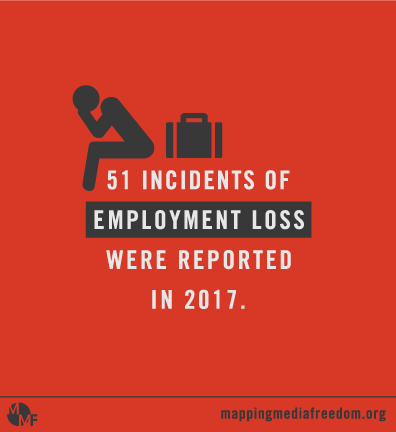 There were 51 reports of job loss recorded on Mapping Media Freedom throughout 2017, more than half of which came from Russia (13), Poland (8) and Spain (5).
There were 51 reports of job loss recorded on Mapping Media Freedom throughout 2017, more than half of which came from Russia (13), Poland (8) and Spain (5). [/vc_column_text][vc_custom_heading text=”Intimidation” use_theme_fonts=”yes”][vc_column_text]
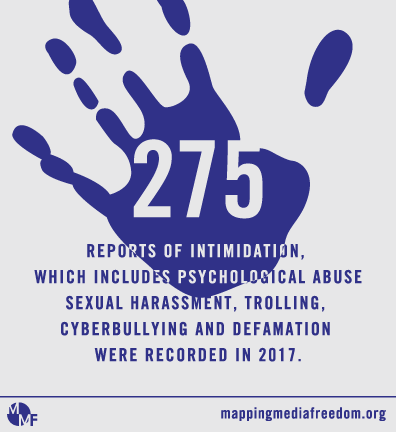 Intimidation was widespread across Europe in 2017, with 275 incidents reported to the map. In the United Kingdom, the BBC’s political editor Laura Kuenssberg was assigned a security detail at the Labour party conference in late September following online threats and abuse. The journalist attracted anger from some Labour supporters for her coverage of the 2016 Labour leadership race and the party’s poor performance in local elections, while a petition for her to be fired received 35,000 signatures.
Intimidation was widespread across Europe in 2017, with 275 incidents reported to the map. In the United Kingdom, the BBC’s political editor Laura Kuenssberg was assigned a security detail at the Labour party conference in late September following online threats and abuse. The journalist attracted anger from some Labour supporters for her coverage of the 2016 Labour leadership race and the party’s poor performance in local elections, while a petition for her to be fired received 35,000 signatures.[/vc_column_text][vc_custom_heading text=”Attacks to property” use_theme_fonts=”yes”][vc_column_text]
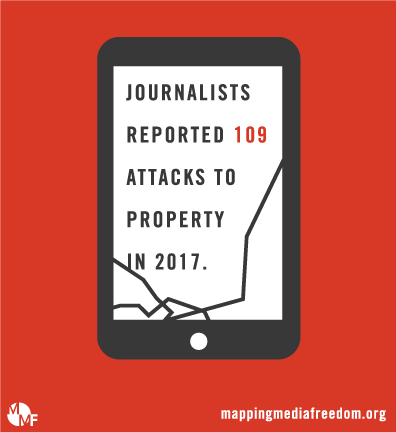 There were 109 attacks on the property of journalists in 2017. On the morning of 26 November Yulia Zavialova, editor-in-chief of the Russian investigative website Bloknot Volgograd, known for its coverage of political and business corruption, asked her father to have the tires on her car checked. Thirty minutes later he rang her to say the brakes were completely out of service. Her brakes had been cut and her anti-lock braking system was damaged. Zavialova called the police but, according to the journalist, they did not properly investigate the scene, failing to take fingerprints or full details of the damage.
There were 109 attacks on the property of journalists in 2017. On the morning of 26 November Yulia Zavialova, editor-in-chief of the Russian investigative website Bloknot Volgograd, known for its coverage of political and business corruption, asked her father to have the tires on her car checked. Thirty minutes later he rang her to say the brakes were completely out of service. Her brakes had been cut and her anti-lock braking system was damaged. Zavialova called the police but, according to the journalist, they did not properly investigate the scene, failing to take fingerprints or full details of the damage.[/vc_column_text][vc_custom_heading text=”Blocked access” use_theme_fonts=”yes”][vc_column_text]
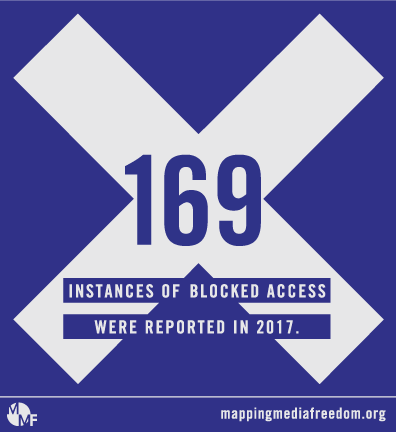 There were 169 confirmed cases of blocked access throughout Europe in 2017, in which journalists were expelled from a location or prevented from speaking to a source by way of obstruction. Many of these reports were connected to other violations, such as assault, damage to property and intimidation.
There were 169 confirmed cases of blocked access throughout Europe in 2017, in which journalists were expelled from a location or prevented from speaking to a source by way of obstruction. Many of these reports were connected to other violations, such as assault, damage to property and intimidation. [/vc_column_text][vc_custom_heading text=”Work censored or altered” use_theme_fonts=”yes”][vc_column_text]
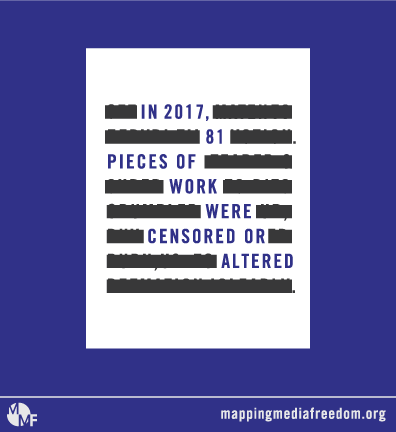 In 2017 Mapping Media Freedom documented 81 cases in which journalists had their work censored or altered. On 15 October in the city of Uppsala, Sweden, local newspaper UNT and public broadcaster SVT identified what they saw as a concerted effort by press officers at the local council to control statements made by staff to journalists. Both complained that press officers were exerting pressure on staff to change statements that reflect badly on the council.
In 2017 Mapping Media Freedom documented 81 cases in which journalists had their work censored or altered. On 15 October in the city of Uppsala, Sweden, local newspaper UNT and public broadcaster SVT identified what they saw as a concerted effort by press officers at the local council to control statements made by staff to journalists. Both complained that press officers were exerting pressure on staff to change statements that reflect badly on the council.[/vc_column_text][vc_separator color=”black” style=”dashed”][vc_column_text]
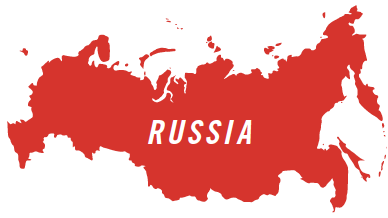 During protests organised by Russian lawyer and activist Alexei Navalny in March and June, 1,000 people were arrested, including 19 journalists, in Moscow, St. Petersburg, Makhachkala, Petrozavodsk and Samara. At a rally in Moscow on 26 March, police detained RBC correspondent Timofey Dzyadko, Mediazona publisher Piotr Verzilov, Open Russia correspondent Sofiko Arifdzhanova, Public Television of Russia journalist Olga Orlova, Echo of Moscow journalist Alexandr Pluschev and Kommersant-FM reporter Pyotr Parkhomenko. At the same rally, Guardian correspondent Alec Luhn was detained after he took a photo of a protester being arrested. He spent more than five hours at a police station without an explanation of why he was detained. Luhn was eventually charged with participating in an unsanctioned rally, even though he showed officers his press accreditation. At least nine media workers were detained across Russia on 8 October during further protests organised by Navalny.
During protests organised by Russian lawyer and activist Alexei Navalny in March and June, 1,000 people were arrested, including 19 journalists, in Moscow, St. Petersburg, Makhachkala, Petrozavodsk and Samara. At a rally in Moscow on 26 March, police detained RBC correspondent Timofey Dzyadko, Mediazona publisher Piotr Verzilov, Open Russia correspondent Sofiko Arifdzhanova, Public Television of Russia journalist Olga Orlova, Echo of Moscow journalist Alexandr Pluschev and Kommersant-FM reporter Pyotr Parkhomenko. At the same rally, Guardian correspondent Alec Luhn was detained after he took a photo of a protester being arrested. He spent more than five hours at a police station without an explanation of why he was detained. Luhn was eventually charged with participating in an unsanctioned rally, even though he showed officers his press accreditation. At least nine media workers were detained across Russia on 8 October during further protests organised by Navalny.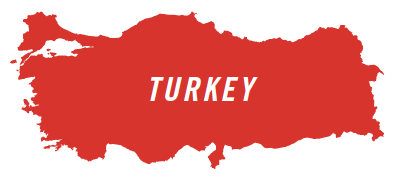 Although the number of violations reported to Mapping Media Freedom that took place in Turkey decreased between 2016 and 2017 — from 231 to 135 — the country remains the number one jailer of journalists in the world with 151 media workers behind bars by the end of 2017. In all, 65 journalists were jailed and sentenced on charges including the spreading of terrorist propaganda. At the trial of journalist Nedim Türfent, who reported on security operations in Turkey’s Kurdish majority provinces, at least a dozen people claimed they were tortured by police.
Although the number of violations reported to Mapping Media Freedom that took place in Turkey decreased between 2016 and 2017 — from 231 to 135 — the country remains the number one jailer of journalists in the world with 151 media workers behind bars by the end of 2017. In all, 65 journalists were jailed and sentenced on charges including the spreading of terrorist propaganda. At the trial of journalist Nedim Türfent, who reported on security operations in Turkey’s Kurdish majority provinces, at least a dozen people claimed they were tortured by police.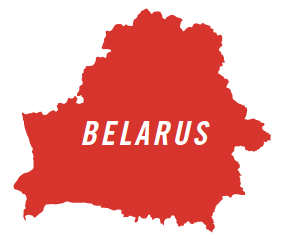 A total of 92 violations of media freedom were recorded in Belarus throughout 2017, including the detainment of 101 journalists. In all, 30 journalists received criminal charges. A wave of detentions occurred on the Belarusian holiday Freedom Day on 25 March, when 36 journalists were placed in custody. Olga Morva, Philip Warwick, Andrey Dubinin, Valery Shchukin, Katsiaryna Bakhvalava, Ihar Ilyash and Volha Davydava said they were beaten by police while under arrest. Warwick, from the United Kingdom, said he was denied the right to contact his embassy after being handcuffed and hit in the face; he spent over six hours at the police station. The apartment of journalist Maryna Kastylyanchanka, who works with human rights organisations, was searched. She was later jailed for 15 days for disobeying police and participating in the unsanctioned mass protests.
A total of 92 violations of media freedom were recorded in Belarus throughout 2017, including the detainment of 101 journalists. In all, 30 journalists received criminal charges. A wave of detentions occurred on the Belarusian holiday Freedom Day on 25 March, when 36 journalists were placed in custody. Olga Morva, Philip Warwick, Andrey Dubinin, Valery Shchukin, Katsiaryna Bakhvalava, Ihar Ilyash and Volha Davydava said they were beaten by police while under arrest. Warwick, from the United Kingdom, said he was denied the right to contact his embassy after being handcuffed and hit in the face; he spent over six hours at the police station. The apartment of journalist Maryna Kastylyanchanka, who works with human rights organisations, was searched. She was later jailed for 15 days for disobeying police and participating in the unsanctioned mass protests.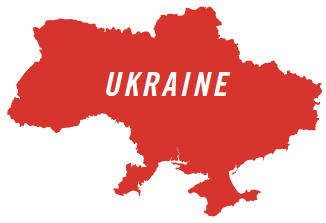 In all, 74 violations against the media in Ukraine were reported to Mapping Media Freedom in 2017. One of the most worrying trends included the treatment of foreign journalists or journalists working for Russian companies. Sixteen journalists were expelled from, or not allowed to enter the country, including some who worked for Russian state media outlets. There were three cases involving the abuse of Interpol warrants to arrest or detain foreign journalists in Ukraine by their countries of origin as a means of silencing critical voices. These were: Azerbaijan, Uzbekistan and Kazakhstan. Three journalists were arrested in territory controlled by self-proclaimed separatists in 2017, including Ukrainian blogger and writer Stanyslav Aseev, one of the few journalists contributing to western and independent media outlets in eastern Ukraine.
In all, 74 violations against the media in Ukraine were reported to Mapping Media Freedom in 2017. One of the most worrying trends included the treatment of foreign journalists or journalists working for Russian companies. Sixteen journalists were expelled from, or not allowed to enter the country, including some who worked for Russian state media outlets. There were three cases involving the abuse of Interpol warrants to arrest or detain foreign journalists in Ukraine by their countries of origin as a means of silencing critical voices. These were: Azerbaijan, Uzbekistan and Kazakhstan. Three journalists were arrested in territory controlled by self-proclaimed separatists in 2017, including Ukrainian blogger and writer Stanyslav Aseev, one of the few journalists contributing to western and independent media outlets in eastern Ukraine.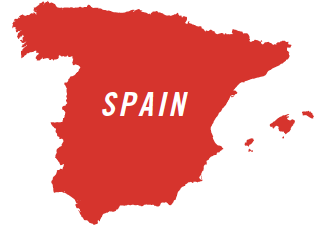 Between 2016 and 2017, media freedom violations in Spain increased from 56 to 66. Journalists experienced difficulties before, during and after the referendum on Catalan independence on 1 October. In July the daily newspaper La Vanguardia, based in Barcelona, refused to publish a column written by Gregorio Morán in which the journalist criticised the “corrupt” regional government of Catalonia. Morán also accused the Catalan media of receiving sums of public money, adding that it was therefore no surprise to see them supporting Catalan independence.
Between 2016 and 2017, media freedom violations in Spain increased from 56 to 66. Journalists experienced difficulties before, during and after the referendum on Catalan independence on 1 October. In July the daily newspaper La Vanguardia, based in Barcelona, refused to publish a column written by Gregorio Morán in which the journalist criticised the “corrupt” regional government of Catalonia. Morán also accused the Catalan media of receiving sums of public money, adding that it was therefore no surprise to see them supporting Catalan independence. [/vc_column_text][vc_column_text]
[/vc_column_text][vc_column_text]
[/vc_column_text][vc_column_text]
[/vc_column_text][/vc_column][/vc_row][vc_row equal_height=”yes” css=”.vc_custom_1521129408155{background-color: #d5473c !important;}”][vc_column width=”1/2″][vc_custom_heading text=”Protect media freedom”][vc_column_text]
We monitor threats to press freedom, produce an award-winning magazine and publish work by censored writers.[/vc_column_text][/vc_column][vc_column width=”1/2″ css=”.vc_custom_1521129253575{background-image: url(https://www.indexoncensorship.org/wp-content/uploads/2018/03/MMF_2017_map-standalone.jpg?id=98665) !important;}”][/vc_column][/vc_row][vc_row][vc_column][vc_empty_space][/vc_column][/vc_row]
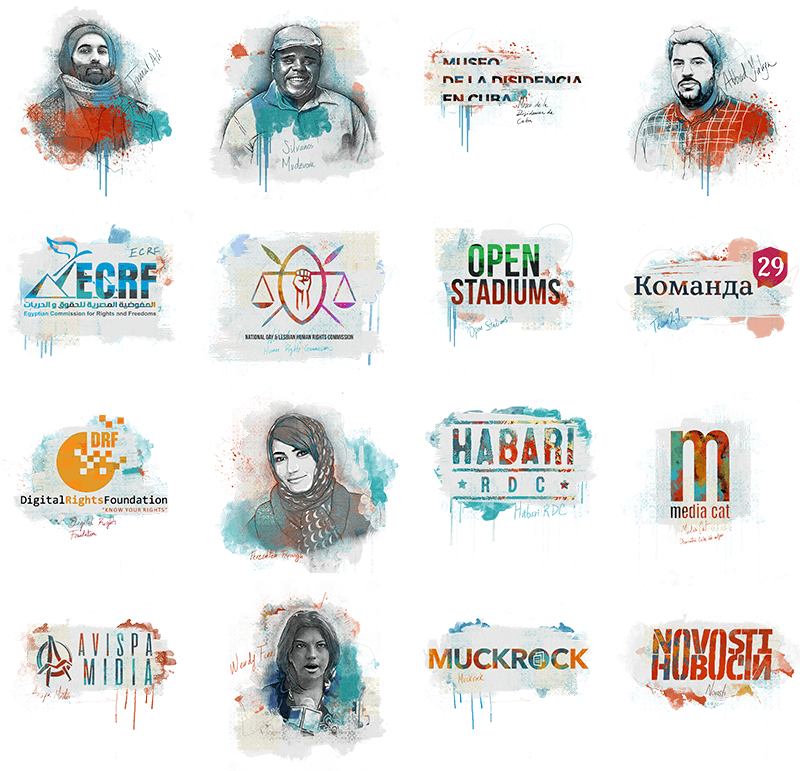
An exiled Azerbaijani rapper who uses his music to challenge his country’s dynastic leadership, a collective of Russian lawyers who seek to uphold the rule of law, an Afghan seeking to economically empower women through computer coding and a Honduran journalist who goes undercover to expose her country’s endemic corruption are among the courageous individuals and organisations shortlisted for the 2018 Index on Censorship Freedom of Expression Awards Fellowships.
Drawn from more than 400 crowdsourced nominations, the shortlist celebrates artists, writers, journalists and campaigners overcoming censorship and fighting for freedom of expression against immense obstacles. Many of the 16 shortlisted nominees face regular death threats, others criminal prosecution or exile.
“Free speech is vital in creating a tolerant society. These nominees show us that even a small act can have a major impact. These groups and individuals have faced the harshest penalties for standing up for their beliefs. It’s an honour to recognise them,” said Jodie Ginsberg, CEO of campaigning nonprofit Index on Censorship.
Awards fellowships are offered in four categories: arts, campaigning, digital activism and journalism.
Nominees include rapper Jamal Ali who challenged the authoritarian Azerbaijan government in his music – and whose family was targeted as a result; Team 29, an association of lawyers and journalists that defends those targeted by the state for exercising their right to freedom of speech in Russia; Fereshteh Forough, founder and executive director of Code to Inspire, a coding school for girls in Afghanistan; Wendy Funes, an investigative journalist from Honduras who regularly risks her life for her right to report on what is happening in the country.
Other nominees include The Museum of Dissidence, a public art project and website celebrating dissent in Cuba; the National Gay and Lesbian Human Rights Commission, a group proactively challenging LGBTI discrimination through the Kenya’s courts; Mèdia.cat, a Catalan website highlighting media freedom violations and investigating under-reported or censored stories; Novosti, a weekly Serbian-language magazine in Croatia that deals with a whole range of topics.
Judges for this year’s awards, now in its 18th year, are BBC reporter Razia Iqbal, CEO of the Serpentine Galleries Yana Peel, founder of Raspberry Pi CEO Eben Upton and Tim Moloney QC, deputy head of Doughty Street Chambers.
Iqbal says: “In my lifetime, there has never been a more critical time to fight for freedom of expression. Whether it is in countries where people are imprisoned or worse, killed, for saying things the state or others, don’t want to hear, it continues to be fought for and demanded. It is a privilege to be associated with the Index on Censorship judging panel.”
Winners, who will be announced at a gala ceremony in London on 19 April, become Index on Censorship Freedom of Expression Awards Fellows and are given year-long support for their work, including training in areas such as advocacy and communications.
“This award feels like a lifeline. Most of our challenges remain the same, but this recognition and the fellowship has renewed and strengthened our resolve to continue reporting, especially on the bleakest of days. Most importantly, we no longer feel so alone,” 2017 Freedom of Expression Awards Journalism Fellow Zaheena Rasheed said.
This year, the Freedom of Expression Awards are being supported by sponsors including SAGE Publishing, Google, Private Internet Access, Edwardian Hotels, Vodafone, media partner VICE News, Doughty Street Chambers and Psiphon. Illustrations of the nominees were created by Sebastián Bravo Guerrero.
Notes for editors:
For more information, or to arrange interviews with any of those shortlisted, please contact Sean Gallagher on 0207 963 7262 or [email protected].
More biographical information and illustrations of the nominees are available at indexoncensorship.org/indexawards2018.

Jamal Ali
Azerbaijan
Jamal Ali is an exiled rapper and rock musician with a history of challenging Azerbaijan’s authoritarian regime. Ali was one of many who took to the streets in 2012 to protest spending around the country’s hosting of the Eurovision song contest. Detained and tortured for his role in the protests, he went into exile after his life was threatened. Ali has persisted in releasing music critical of the country’s dynastic leadership. Following the release of one song, Ali’s mother was arrested in a senseless display of aggression. In provoking such a harsh response with a single action, Ali has highlighted the repressive nature of the regime and its ruthless desire to silence all dissent.
Silvanos Mudzvova
Zimbabwe
Playwright and activist Silvanos Mudzvova uses performance to protest against the repressive regime of recently toppled President Robert Mugabe and to agitate for greater democracy and rights for his country’s LGBT community. Mudzvova specialises in performing so-called “hit-and-run” actions in public places to grab the attention of politicians and defy censorship laws, which forbid public performances without police clearance. His activism has seen him be traumatically abducted: taken at gunpoint from his home he was viciously tortured with electric shocks. Nonetheless, Mudzvova has resolved to finish what he’s started and has been vociferous about the recent political change in Zimbabwe.
The Museum of Dissidence
Cuba
The Museum of Dissidence is a public art project and website celebrating dissent in Cuba. Set up in 2016 by acclaimed artist Luis Manuel Otero Alcántara and curator Yanelys Nuñez Leyva, their aim is to reclaim the word “dissident” and give it a positive meaning in Cuba. The museum organises radical public art projects and installations, concentrated in the poorer districts of Havana. Their fearlessness in opening dialogues and inhabiting public space has led to fierce repercussions: Nuñez was sacked from her job and Otero arrested and threatened with prison for being a “counter-revolutionary.” Despite this, they persist in challenging Cuba’s restrictions on expression.
Abbad Yahya
Palestine
Abbad Yahya is a Palestinian author whose fourth novel, Crime in Ramallah, was banned by the Palestinian Authority in 2017. The book tackles taboo issues such as homosexuality, fanaticism and religious extremism. It provoked a rapid official response and all copies of the book were seized. The public prosecutor issued a summons for questioning against Yahya while the distributor of the novel was arrested and interrogated. Yahya also received threats on social media and copies of the book were burned. Despite this, he has spent the last year giving interviews to international and Arab press and raising awareness of freedom of expression and the lives of young people in the West Bank and Gaza, particularly in relation to their sexuality.

Egyptian Commission for Rights and Freedoms
Egypt
The Egyptian Commission for Rights and Freedoms or ECRF is one of the few human rights organisations still operating in a country which has waged an orchestrated campaign against independent civil society groups. Egypt is becoming increasingly hostile to dissent, but ECRF continues to provide advocacy, legal support and campaign coordination, drawing attention to the many ongoing human rights abuses under the autocratic rule of President Abdel Fattah-el-Sisi. Their work has seen them subject to state harassment, their headquarters have been raided and staff members arrested. ECRF are committed to carrying on with their work regardless of the challenges.
National Gay and Lesbian Human Rights Commission
Kenya
The National Gay and Lesbian Human Rights Commission is the only organisation in Kenya proactively challenging and preventing LGBTI discrimination through the country’s courts. Even though being homosexual isn’t illegal in Kenya, homosexual acts are. Homophobia is commonplace and men who have sex with men can be punished by up to 14 years in prison, and while no specific laws relate to women, former Prime Minister Raila Odinga has said lesbians should also be imprisoned. NGLHRC has had an impact by successfully lobbying MPs to scrap a proposed anti-homosexuality bill and winning agreement from the Kenya Medical Association to stop forced anal examination of clients “even in the guise of discovering crimes.”
Open Stadiums
Iran
The women behind Open Stadiums risk their lives to assert a woman’s right to attend public sporting events in Iran. The campaign that challenges the country’s political and religious regime, and engages women in an issue many human rights activists have previously thought unimportant. Iranian women face many restrictions on using public space. Open Stadiums has generated broad support for their cause in and out of the country. As a result, MPs and people in power are beginning to talk about women’s rights to attend sporting events in a way that would have been taboo before.
Team 29
Russia
Team 29 is an association of lawyers and journalists that defends those targeted by the state for exercising their right to freedom of speech in Russia. It is crucial work in a climate where hundreds of civil society organisations have been forced to close and where increasingly tight restrictions have been placed on public protest and political dissent since mass demonstrations rocked Russia in 2012. Team 29 conducts about 50 court cases annually, many involving accusations of high treason. Aside from litigation, they offer legal guides for activists, advice on what to do when state security comes for you and how to conduct yourself under interrogation.

Digital Rights Foundation
Pakistan
In late 2016, the Digital Rights Foundation established a cyber-harassment helpline that supported more than a thousand women in its first year of operation alone. Women make up only about a quarter of the online population in Pakistan but routinely face intense bullying including the use of revenge porn, blackmail, and other kinds of harassment. Often afraid to report how badly they are treated, women react by withdrawing from online spaces. To counter this, DRF’s Cyber Harassment Helpline team includes a qualified psychologist, digital security expert, and trained lawyer, all of whom provide specialised assistance.
Fereshteh Forough
Afghanistan
Fereshteh Forough is the founder and executive director of Code to Inspire, a coding school for girls in Afghanistan. Founded in 2015, this innovative project helps women and girls learn computer programming with the aim of tapping into commercial opportunities online and fostering economic independence in a country that remains a highly patriarchal and conservative society. Forough believes that with programming skills, an internet connection and using bitcoin for currency, Afghan women can not only create wealth but challenge gender roles and gain independence.
Habari RDC
Congo
Launched in 2016, Habari RDC is a collective of more than 100 young Congolese bloggers and web activists, who use Facebook, Twitter and YouTube to give voice to the opinions of young people from all over the Democratic Republic of Congo. Their site posts stories and cartoons about politics, but it also covers football, the arts and subjects such as domestic violence, child exploitation, the female orgasm and sexual harassment at work. Habari RDC offers a distinctive collection of funny, angry and modern Congolese voices, who are demanding to be heard.
Mèdia.cat
Spain
Mèdia.cat is a Catalan website devoted to highlighting media freedom violations and investigating under-reported or censored stories. Unique in Spain, it was a particularly significant player in 2017 when the heightened atmosphere in Catalonia over the disputed independence referendum brought issues of censorship and the impartiality of news under the spotlight. The website provides an online platform that catalogues systematically, publicly and in real time censorship perpetrated in the region. Its map on censorship offers a way for journalists to report on abuses they have personally suffered.

Avispa Midia
Mexico
Avispa Midia is an independent online magazine that prides itself on its daring use of multimedia techniques to bring alive the political, economic and social worlds of Mexico and Latin America. It specialises in investigations into organised criminal gangs and the paramilitaries behind mining mega-projects, hydroelectric dams and the wind and oil industry. Many of Avispa’s reports in the last 12 months have been focused on Mexico and Central America, where the media group has helped indigenous and marginalised communities report on their own stories by helping them learn to do audio and video editing. In the future, Avispa wants to create a multimedia journalism school to help indigenous and young people inform the world what is happening in their region, and break the stranglehold of the state and large corporations on the media.
Wendy Funes
Honduras
Wendy Funes is an investigative journalist from Honduras who regularly risks her life for her right to report on what is happening in the country, an extremely harsh environment for reporters. Two journalists were murdered in 2017 and her father and friends are among those who have met violent deaths in the country – killings for which no one has ever been brought to justice. Funes meets these challenges with creativity and determination. For one article she had her own death certificate issued to highlight corruption. Funes also writes about violence against women, a huge problem in Honduras where one woman is killed every 16 hours.
MuckRock
United States
MuckRock is a non-profit news site used by journalists, activists and members of the public to request and share US government documents in pursuit of more transparency. MuckRock has shed light on government surveillance, censorship and police militarisation among other issues. MuckRock produces its own reporting, and helps others learn more about requesting information. Last year the site produced a Freedom of Information Act 4 Kidz lesson plan to help educators to start discussions about government transparency. Since then, they have expanded their reach to Canada. The organisation hopes to continue increasing their impact by putting transparency tools in the hands of journalists, researchers and ordinary citizens.
Novosti
Croatia
Novosti is a weekly Serbian-language magazine in Croatia. Although fully funded as a Serb minority publication by the Serbian National Council, it deals with a whole range of topics, not only those directly related to the minority status of Croatian Serbs. In the past year, the outlet’s journalists have faced attacks and death threats mainly from the ultra-conservative far-right. For its reporting, the staff of Novosti have been met with protest under the windows of the magazine’s offices shouting fascist slogans and anti-Serbian insults, and told they would end up killed like Charlie Hebdo journalists. Despite the pressure, the weekly persists in writing the truth and defending freedom of expression.
[vc_row][vc_column][vc_video link=”https://youtu.be/Gy4ZfnnTOKM”][vc_column_text]A speech given by Index on Censorship CEO Jodie Ginsberg at St Mary’s Cathedral, Limerick, Ireland for the Limerick Civic Trust in association with Banned Books Week.
In 1634, the English lawyer and author William Prynne was sentenced to life imprisonment, fined £5,000 (more than £1 million in today’s money) and had both his ears cut off. His crime? The publication of Histriomastix – a thousand-page Puritanical tome dedicated to showing that plays were unlawful and incentives to immorality. He didn’t have many good things to say about women either.
It is a dreadful irony that this work, which in effect advocates censorship, resulted in some of the most gruesome punishments you can inflict on an author for their writing. Nor did his punishment end there – accused of publishing”seditious libels” again in 1637, Prynne had the letter SL branded on both his cheeks.
I mention the example of Prynne because it is the first cited in an exhibition of book covers currently on display at Pembroke College, Cambridge, where this week my organisation kicked off a series of talks and discussions for Banned Books Week, of which this lecture is the final event.
And I mention it because while it reminds us of how far we in the UK and Ireland have come in the past 350 years, the exhibition was also a powerful reminder of the fact that censorship is still alive and well – albeit in different forms – in our democracies. The exhibition ran along two sides of the library. On one side were the cases from the 1630s to 1800s. The entire other side reflected instances of censorship in the UK just in the past 100 years. This included – in 1946 – the burning of copies of insipid love story Forever Amber by Kathleen Winsor – not by the state but by public libraries no less.
Stop to think of that for a moment. In 1946, barely a decade after the perhaps some of the most infamous book brings in history – those of Nazi Germany, public libraries in the UK thought it fit and proper to burn a historical romance that one judge in the States described as “soporific rather than aphrodisiac”.
That was 1946. A bygone era perhaps? Sadly not. Sixty-four years later in 2000, a New York-based Limerick man took out a $800 half-page advertisement in Irish-American newspaper, the Irish Echo, inviting people to bring copies of Angela’s Ashes to a book-burning ceremony to protest this way this city was treated in the novel and the film of the same name.
The Angela’s Ashes incident shows us the urge to censor, to limit the publication or promotion of ideas we find offensive – whether on grounds of obscenity, of religion, or politics, remains strong.
This talk will examine the new sources of censorship – not just in the context of literature – and posit some ways we can resist the urge to silence others.
First, a little about myself and why I care about these issues and about the organisation I run. I am a journalist and have wanted to be a journalist for as long as I can remember. As a child, I would make my friends play ‘the news’ which we then performed to our long-suffering parents and I dreamed of being BBC foreign correspondent Kate Adie. When I finally got to cover a war – civil conflict in Ivory Coast – I discovered I did not after all want to become a war correspondent and ended up as London Bureau Chief for Reuters news agency. Whereupon I found myself in charge of coverage for the UK riots of 2011.
I became a journalist because I wanted to tell stories that were not being heard. I love literature because I believe in the power of the written word to convey and transport us to a world beyond our own imagining and that my own world is enriched as a result.
So it seemed a natural fit when I was asked if I was interested in running Index on Censorship, one of the world’s leading organisations in the defence of free expression. Index on Censorship was founded 45 years ago by the poet Stephen Spender in response to what seemed like a simple request: what could the artists and intellectuals of the West do to support their counterparts behind the Iron Curtain and those under the thumb of oppressive regimes elsewhere? Organisations like Amnesty and PEN already existed, doing then – as now – a formidable job of petitioning and campaigning, particularly on the cases of the imprisoned. What more could be done? The answer – those who established Index decided – was to publish the works of these censored writers and artists and stories about them. Index on Censorship magazine was born and we have continued to produce the magazine – this magazine – on at least a quarterly basis ever since. Writers for the magazine have included the likes of Arthur Miller, Nadine Gordimer, Hilary Mantel, Vaclav Havel – and Samuel Beckett.
One of the t-shirts featured in the Index on Censorship archive reads: “If Samuel Beckett had been born in Czechoslovakia we’d still be waiting for Godot”.
It was part of a campaign that Beckett supported to bring attention to the plight of writers in then Czechoslovakia. Beckett’s play was banned in the east European country at the same time as the communist government was persecuting its own writers. Beckett became drawn to the case of Czech playwright Havel, and committed to bringing world attention to the way writers were being banned.
Beckett was so incensed by what was happening to Havel that he wrote the short play Catastrophe, dedicated it to Havel, and allowed Index the exclusive, to publish it first in its pages.
Beckett’s action encapsulates the motivation of those who first established Index. This motivation, as Stephen Spender wrote in the first edition of the magazine, was to act always with concern for those not free, responding to the appeals from Soviet writers to their Western counterparts. “The Russian writers,” Spender wrote, “seem to take it for granted that in spite of the ideological conditioning of the society in which they live, there is nevertheless an international community of scientists, writers and scholars thinking about the same problems and applying to them the same human values. These intellectuals regard certain guarantees of freedom as essential if they are to develop their ideas fruitfully… Freedom, for them, consists primarily of conditions which make exchange of ideas and truthfully recorded experiences possible.”
I will ask in my talk this evening – given the debates about no-platforming in universities, the controversy over kneeling for the US flag, the fact that the BBC’s political correspondent needs a bodyguard to cover a political conference, whether we currently have the ‘conditions which make exchange of ideas possible’.
Why is it important to tackle censorship? Sometimes we forget to ask ourselves this question because we take it for granted that freedom is a good thing. Consider all those who were quick to shout ‘Je Suis Charlie’ following the attacks on French satirical magazine Charlie Hebdo – the knee-jerk reaction in Western liberal democracies is often to say you are for free speech, without ever really stopping to consider why you might be for it. Or why free speech is and of itself a good thing.
I would argue this failure to understand the value of free speech lies at the heart of one of the dilemmas we face in modern democracies where free speech is being gradually eroded – where ‘Je Suis Charlie’ quickly became ‘Je Suis Charlie, but…’.
It is vital to understand the value inherent in free expression to understand why some of the current tensions surrounding free speech exist. It is also crucial for understanding ways to tackle the dangerous trade-offs that are increasingly being made in which free expression is seen as a right that must be pitted against safety, security, and privacy.
John Stuart Mill talks of free expression being fundamental to the “permanent interests of man as a progressive being.” “The particular evil of silencing the expression of an opinion,” he argues in On Liberty, “is that it is robbing the human race… If the opinion is right, they are deprived of the opportunity of exchanging error for truth; if wrong, they lose, what is almost as great a benefit, the clearer perception and livelier impression of truth produced by its collision with error.”
This latter argument is particularly powerful when we consider, for example, the introduction of Holocaust denial laws. Such laws suggest that there are some truths so precious that they have to be protected by laws, rather than having their truth reinforced by repeated “collision with error.” You can imagine authoritarian regimes everywhere looking at such laws and rubbing their hands with glee at the prospect of being able to impose a single view of history on the populace, without any kind of challenge.
The free exchange of ideas, opinions, and information is in Mill’s doctrine a kind of positive cacophony from which clear sounds emerge. In this doctrine, it is not just the having of ideas, but the expressing of them that becomes vital.
Which brings us back to the question of whether we have the conditions for the exchange of ideas possible in 2017 across the world. I want to focus on four key areas on which Index campaigns for free expression: the arts, academia, media and online, and look at what I consider to be some of the main sources of censorship, by which I mean the attempt to silence and stifle ideas and debate, in democratic countries and further afield.
Let us begin with the arts. A number of recent cases I think highlight the contemporary censorious impulses in democracies: the first is the case of Exhibit B, a theatrical installation meant to highlight the horrors of so-called human zoos of the 19th century. Created by white artist Brett Bailey, Exhibit B was described by London’s Barbican as a “human installation that charts the colonial histories of various European countries during the nineteenth and twentieth centuries when scientists formulated pseudo-scientific racial theories that continue to warp perceptions with horrific consequences.” Exhibit B involved black actors often chained or in masks, sitting silently while viewers to the installation filed past.
In 2014, Exhibit B – which received five-star reviews elsewhere and was successfully shown just weeks before at the Edinburgh Festival – was pulled from a planned staging at the Barbican on the advice of police following a sustained campaign against the work online and off, including a very vocal protest outside the theatre.
Those who objected to the artwork – many of whom had not seen it – described it as racist. Now, I am not objecting to people’s right to protest against works or ideas they find offensive. Indeed, that is a fundamental tenet of freedom of expression. But what is salient, I think, about Exhibit B is that it demonstrates a growing belief that the opinions of one set of people should be allowed to infringe the legal rights of others to express themselves. Exhibit B was not closed down by police for hate speech or inciting violence, it was closed down because the police and the venue itself did not believe they could protect the audience or actors from any potential spillover from the protests about the work. In this case, one group of self-appointed spokespeople for a community infringed the rights of others to express themselves. As Stella Odunlami, an actor who took part in the Barbican Exhibit B, wrote in The Guardian: “I chose to take part in Exhibit B because I was inspired by the premise of the work… It forces us to examine the darkest corners of our mind. It is brutal, unforgiving and unapologetic. I decided, as an educated black artist, that it told a story that should be shared with the world, but sadly that will no longer be the case. My freedom of expression was taken the moment the protesters decided to attempt to storm the venue, causing it to be evacuated and deemed unsafe. It was at that moment that the protesters retained their right to free speech and I had mine taken away.”
Offence and hurt are in the eye of the beholder. Once we let a mob decide what can and cannot be expressed, we are in dangerous territory indeed.
We see this mob mentality most often reflected in the hysteria that whips up at speed when an individual or group of individuals takes offence on social media about something and how that fireball of fury can intimidate artists and others to self-censor as result. Irish author Claire Hennessy spoke eloquently about this at an event Index hosted in London last night.
Such campaigns do not just force self-censorship, they can prevent works from getting an audience at all. Consider a young adult novel called The Black Witch about a girl named Elloren who has been raised in a stratified society where other races (including selkies, fae, wolfmen, etc.) are considered inferior at best and enemies at worst. When she goes off to college, she begins to question her beliefs. The book was subjected to a sustained campaign of online abuse ahead of publication after one blogger wrote that the fantasy novel was “the most dangerous, offensive book I have ever read.” Its Goodreads rating dropped to an abysmal 1.71 thanks to a mass coordinated campaign of one-star reviews, mostly from people who admitted to not having read it.
Nervousness about offence is not restricted to concerns about the reaction it might generate in the online world. Salman Rushdie has said he does not think the Satanic Verses would be published today. And in the wake of the killing of those associated with Charlie Hebdo, the killings at the Bataclan nightclub in Paris, the shooting at a free speech event in Copenhagen it is not difficult to see why.
This mob as censor dynamic is something we shall see rearing its head again when we come to talk about media and academia and is one of the pincer movements I identify at being at the heart of modern censorship in democracies.
The second pincer movement is led primarily by governments and relates to a privileging of national security over almost all other values in modern societies. The crackdowns justified in the name of national security are widespread and increasingly misused. Take, for example, the current situation in Turkey. It is not just journalists who face the ire of President Erdogan as he seeks to weed out his enemies. Artists face his wrath too. Cartoonist Musa Kart, for example, has been in detention for the past 10 months and faces 29 years in jail for his cartoons satirising the government.
Jailing is one way to silence your enemies. Another is travel bans. In Malaysia, another cartoonist, Zunar, is currently subject to a travel ban – and faces 43 years in jail for his work satirising the Prime Minister and his wife.
In these democracies, those in power behave increasingly like despots. And one thing autocrats seem to hate more than anything is being laughed at. if you don’t believe me, consider the fact that President Erdogan tried to have the German government prosecute a German comedian for reciting – on German television – a poem that lampooned him. Even worse, German Chancellor Angela Merkel paved the way for his possible prosecution of Jan Böhmermann by leaving it up to prosecutors to decide whether to take the case forward.
If free speech cannot be defended by Germany within its own borders, what hope is there for its global defence?
I want to say something here about the importance of a robust defence of fundamental, universal rights and freedoms within democracies as standard bearers for these rights globally. Autocratic and repressive regimes look to justify their own behaviour by pointing to comparable actions in democracies.
That is why we at Index welcome the fact that Ireland’s blasphemy law will be considered in the upcoming referendum. Ireland is the only country in the western developed world to have introduced a blasphemy law in the 21st century and that has given succour to those countries who wield their own blasphemy laws to punish apostates.
For instance, the Organisation of Islamic Cooperation – which has 57 member states – cites Ireland’s law as best practice and has even proposed adopting its precise wording to limit human rights on freedom of conscience. It gives strength to the likes of OIC member Pakistan where a woman – Asia Bibi – is currently in jail awaiting execution for having drunk the same water as her Muslim neighbours.
Freedom to express one’s religious belief is on the barometer of the state of free expression.[/vc_column_text][/vc_column][/vc_row][vc_row][vc_column][vc_custom_heading text=”Stay up to date on freedom of expression” use_theme_fonts=”yes”][vc_separator color=”black”][vc_row_inner][vc_column_inner width=”1/2″][vc_column_text]Index on Censorship is a nonprofit that campaigns for and defends free expression worldwide. We publish work by censored writers and artists, promote debate, and monitor threats to free speech. We believe that everyone should be free to express themselves without fear of harm or persecution – no matter what their views.
Join the our mailing list and we’ll send you our weekly newsletter about our activities defending free speech. We won’t share your personal information with anyone outside Index.[/vc_column_text][/vc_column_inner][vc_column_inner width=”1/2″][gravityform id=”20″ title=”false” description=”false” ajax=”false”][/vc_column_inner][/vc_row_inner][vc_separator color=”black”][/vc_column][/vc_row][vc_row][vc_column][vc_column_text]A second important indicator by which freedom of expression can be measured is the state of its media. And on this measure, the picture is also far from rosy. Index has been running a project since 2014 on threats to media freedom in Europe and neighbouring countries. The picture that the Mapping Media Freedom project paints is alarming. Journalists in our region have been killed, arrested and systematically harassed for doing their jobs. And the harassment isn’t taking place only in countries where you might expect it: Turkey, Russia, Belarus, Ukraine, but much closer to home.
Only this week, we learned the BBC’s political correspondent has been assigned a bodyguard because of threats against her. Think about that for a moment. One of the most senior journalists at Britain’s public broadcaster requires a security detail to cover the conference of the country’s leading opposition party.
Online harassment, intimidation by the state, and legal measures are all ways in which attempts to silence the media are made. In some countries, the stakes for journalists are impossibly high. In Mexico, more than eight journalists have been killed this year alone as the cartels, vigilante groups and security forces wrestle for power. Few of these killings are ever solved, encouraging an atmosphere of impunity. In Turkey, hundreds of journalists are in jail. And at the far end of the spectrum, countries like Eritrea have no independent media whatsoever. In between are countries like Ireland, which a report in 2016 by human rights lawyers Doughty Street Chambers found had one of the most concentrated media markets of any democracy. The report said accumulation of what has been described as “communicative power” within the news markets was at endemic levels, and this, combined with the dominance of one private individual media owner in the State, created “conditions in which wealthy individuals and organisations can amass huge political and economic power and distort the media landscape to suit their interests and personal views.
And in discrediting and dismissing all journalism he doesn’t like as “fake news”, the President of the United States creates an environment in which attacks on journalists feel like fair game. Everywhere.
The President’s preferred communications milieu is, of course, social media and the internet is currently the battleground for some of the most important debates on free speech in the 21st century.
On the one hand, the internet offers an incredible tool for democratising speech: a relatively cheap platform that allows anyone with the access the means to make their voice heard. However, it also provides a tool for the nasty, cruel – and often just frankly the bored – to harass and bully others into silence. That is a challenge that we as free speech advocates would be wrong to ignore but for which censorship is the wrong answer.
Nor is the answer effectively abolishing privacy on the internet. This is the particularly pervasive argument used in Western liberal democracies to justify surveillance in the name of national security. If you have nothing to hide, you have nothing to fear, the mantra goes: in liberal democracies, we’re not interested in your ideas, we’re just out to get the bad guys committing crimes. It shouldn’t stop you expressing yourself.
Except that it does. Knowledge of mass surveillance by governments is already changing the way in which writers work. A report from PEN American Center, Global Chilling, shows an astonishing one-third of writers – 34 percent – living in countries deemed “free” have avoided writing or speaking on a particular topic, or have seriously considered it, due to fear of government surveillance. Some 42 percent of writers in “free countries” have curtailed or avoided activities on social media, or seriously considered it, due to fear of government surveillance, the survey found. In countries that are not free, the consequence of a lack of privacy is acute. Colleagues in Azerbaijan, for example, note that authorities are quick to demonstrate the country’s openness by arguing a lack of curbs on social media. They don’t need a curb – as soon as you express yourself openly, the crackdown begins.
But it is not just in countries like Azerbaijan that we have to worry about surveillance or the misuse of national security laws. In 2014, British police used legislation introduced explicitly to tackle terrorism to obtain the phone records of The Sun newspaper’s Tom Newton Dunn for an investigation into whether one of its officers had leaked information about a political scandal, an action that seriously comprising the basic tenet of a free and independent media: the confidentiality of sources.
Even the hardware being used to quash free expression in authoritarian regimes comes from supposed democracies. Journalist Iona Craig, a regular reporter from Yemen, describes the phone tapping and other surveillance methods – using hardware and software bought from the West – that put her and her sources at risk. She and her colleagues now resort to traditional methods of reporting – meeting contacts in person, using pen and paper, to evade surveillance.
Privacy, then, is the natural corollary of freedom of expression. It allows reporters to protect their sources in pursuit of truth and advocacy organisations like ours to protect those whom governments seek to silence. But privacy rights should not trump freedom of expression in such a way that they prevent us coming closer to the truth.
It is for this reason that Index on Censorship opposed the so-called ‘Right to be Forgotten’ ruling that allows ‘private’ individuals the ability to remove links to information they considered irrelevant or outmoded. In theory, this sounds appealing. Which one of us would not want to massage the way in which we are represented to the outside world? Certainly, anyone who has had malicious smears spread about them in false articles, or embarrassing pictures posted of their teenage exploits, or even criminals whose convictions are spent and have the legal right to rehabilitation. In practice, though, the ruling is far too blunt, far too broad brush, and gives far too much power to the search engines.
This handing off of responsibility to internet companies to police and censor content is something we need to be far more alive to.
Increasingly, the protection of the individual, using notions of harm defined by the individual themselves – is used as an argument for censorship. I want to use the remainder of my talk to discuss ways in which this drive to shield from potential and perceived harm, is having an impact, with a particular focus on academia.
It is clear that something is going wrong at universities. Institutions that should be crucibles for new thinking, at the forefront of challenges to established thought and practice, are instead actively shutting down debate, and shying away from intellectual confrontation.
Driven by the notion that students should not be exposed to ideas they find – or might find – offensive or troubling, student groups and authorities are increasingly squeezing out free speech – by banning controversial speakers, denying individuals or groups platforms to speak, and eliminating the possibility of “accidental” exposure to new ideas through devices such as trigger warnings.
In recent years a number of invited speakers have withdrawn from university engagements – or had their invitations rescinded – following protests from students and faculty members. Former US Secretary of State Condoleezza Rice withdrew from a planned address at Rutgers University in New Jersey after opposition from those who cited her involvement in the Iraq war and the Bush administration’s torture of terrorism suspects; Brandeis University in Massachusetts cancelled plans to award an honorary degree to Islam critic Ayaan Hirsi Ali; and Christine Lagarde backed out of a speech at Smith College following objections by students over the acts of the International Monetary Fund, which Lagarde runs. In the UK, the University of East London banned an Islamic preacher for his views on homosexuality.
Registering your objection to something or someone is one thing. Indeed, the ability to do that is fundamental to free expression. Actively seeking to prevent that person from speaking or being heard is quite another. As I alluded to earlier, it is a trend increasingly visible in social media – and its appearance within universities is deeply troubling.
It is seen not just in the way invited speakers are treated, but it stretches to the academic fraternity itself. The University of Illinois at Urbana-Champaign withdrew a job offer to academic Steven Salaita following critical posts he made on Twitter about Israel.
In an open letter, Phyllis Wise, University of Illinois at Urbana-Champaign chancellor, wrote: “A pre-eminent university must always be a home for difficult discussions and for the teaching of diverse ideas… What we cannot and will not tolerate at the University of Illinois are personal and disrespectful words or actions that demean and abuse either viewpoints themselves or those who express them. We have a particular duty to our students to ensure that they live in a community of scholarship that challenges their assumptions about the world but that also respects their rights as individuals.”
These incidents matter because, as education lecturer Joanna Williams wrote in The Telegraph newspaper: “If academic freedom is to be in anyway meaningful it must be about far more than the liberty to be surrounded by an inoffensive and bland consensus. Suppressing rather than confronting controversial arguments prevents criticality and the advance of knowledge, surely the antithesis of what a university should be about?”
Yet, increasingly, universities seem to want to shut down controversy, sheltering behind the dangerous notion that protecting people from anything but the blandest and least contentious ideas is the means to keep them “safe”, rather than encouraging students to have a wide base of knowledge. In the US, some universities are considering advising students that they don’t have to read material they may find upsetting, and if they don’t their course mark would not suffer. The introduction of “trigger warnings” at a number of universities is a serious cause for concern.
In the UK, increasing intolerance for free expression is manifest in the “no platform” movement – which no longer targets speakers or groups that incite violence against others, but a whole host of individuals and organisations that other groups simply find distasteful, or in some way disqualified from speaking on other grounds.
The decision to cancel an abortion debate at Oxford in late 2014, which would have been held between two men – and noted free speech advocates – came after a slew of objections, including a statement from the students’ union that decried the organisers for having the temerity to invite people without uteruses to discuss the issue. More recently, a human rights campaigner was barred from speaking at Warwick University – a decision that was subsequently overturned – after organisers were told she was “highly inflammatory and could incite hatred” and a feminist was banned from speaking at the University of Manchester because her presence was deemed to violate the student union’s “safe space” policy.
Encountering views that make us feel uncomfortable, that challenge our worldview are fundamental to a free society. Universities are places where that encounter should be encouraged and celebrated. They should not be places where ideas are wrapped in cotton wool, where academic freedom comes to mean having a single kind of approved thinking, or where only certain “approved” individuals are allowed to speak on a given topic.
Index on Censorship knows well the importance of the scholar in freedom of expression. Though we have come to be known as Index, the charity itself is officially called Writers and Scholars Educational Trust, an effort to capture as simply as possible the individuals whom we intended to support from the outset. The title was never intended to be exclusive, but the inclusion of “scholar” signals the importance our founders attached to the role of the academic as a defender and promoter of free speech. In 2017, as we watch the spaces for free expression narrow, I hope that together we can work doubly hard to ensure that traditional bastions for free speech — and indeed institutions like the church in which we stand that were not always its greatest advocates — remain arena for the clash of ideas, not the closure of minds.[/vc_column_text][/vc_column][/vc_row][vc_row][vc_column][vc_basic_grid post_type=”post” max_items=”12″ style=”load-more” items_per_page=”4″ element_width=”6″ grid_id=”vc_gid:1508139239119-b59a9835-c70f-3″ taxonomies=”6323″][/vc_column][/vc_row]
[vc_row][vc_column][vc_single_image image=”95179″ img_size=”full” alignment=”center”][vc_column_text]This column originally appeared in the Evening Standard.[/vc_column_text][vc_column_text]”Part of building an open, inclusive environment means fostering a culture in which those with alternative views…feel safe sharing their opinions.” Hear, hear. This is a view that so chimes with my beliefs as a free-speech campaigner that I could have written it myself. In fact, those are the words of Danielle Brown, Google’s vice-president of diversity, integrity and governance, in response to the furore over the so-called Google manifesto — the 10-page document in which Google software engineer James Damore outlined his views on why women don’t reach the top roles in certain jobs, arguing why the company’s diversity pushes were misplaced. Google so cherishes diversity it sacked a man for expressing an opinion it didn’t agree with… Spot a problem here?
In all the furore surrounding Damore’s memo, most of the focus has been on critiquing the views he expressed on the differences between men and women, but far less attention has been paid to the broader point he was trying to make: that unpopular views, views that did not accord with the mainstream ideology in the company, could not be expressed. And that this in turn could lead to a monotheistic culture that is not good for business.
“When it comes to diversity and inclusion, Google’s Left bias has created a politically correct monoculture that maintains its hold by shaming dissenters into silence,” Damore wrote. By sacking him, Google made Damore’s point for him.
Damore expressed a viewpoint that did not accord with the mainstream and he was sacked. I have read plenty of articles arguing he was dismissed not for expressing his opinion but because the expressing of that opinion made colleagues feel unsafe or uncomfortable (more on that later), or justifying the sacking because an employer has the right to discipline employees where their behaviour brings the company into disrepute. But actually, what those who defend Damore’s sacking are really doing is reinforcing something that is increasingly prevalent in our societies: a kind of liberal intolerance.
[/vc_column_text][vc_row_inner][vc_column_inner width=”1/4″][vc_icon icon_fontawesome=”fa fa-times-circle” color=”black” background_style=”rounded” size=”xl”][/vc_column_inner][vc_column_inner width=”3/4″][vc_column_text]
[/vc_column_text][/vc_column_inner][/vc_row_inner][vc_column_text]I heard it a lot in the wake of the killings at French satirical magazine Charlie Hebdo: “I believe in free speech, but…” and after that “but” came all kinds of things that the supposed defenders of free speech were in favour of censoring because they felt such censorship would better protect marginalised communities. The argument seemed to be that by banning certain kinds of speech we would somehow miraculously eradicate the dangerous, insidious and hateful viewpoints that underlie it.
This “it is OK to censor certain opinions” line is one most clearly articulated in universities — something Damore alluded to in his own manifesto. Views that are considered offensive are dubbed harmful, and speakers are drummed off campus — in some cases physically. In one incident earlier this year, Dr Charles Murray — a political scientist labelled a “white nationalist” for his book linking race and intelligence — was attacked by students after he tried to give a talk at Middlebury College in Vermont.
Ideas are not challenged by silencing them. Indeed, the video of Murray being shouted down by a group of students denying his right to speak demonstrates how an event that could have been an opportune moment to challenge ideas with which the students disagreed simply became an exercise in controlling the narrative. Imagine if the opposite had happened. Imagine if a Black Lives Matter activist had been shut down on campus by a ranting white supremacist mob. There would have been an international uproar.
And that’s the point. Free speech — genuine free speech that tolerates the ideas we find most offensive — must apply equally. It must apply to the ideas we hate as much as to the ideas we champion. What protects Damore’s right to opine that women are “more co-operative and agreeable than men” (Seriously? Has Damore met any actual women?) is also what protects my right to say his views are a laughable load of bollocks. What gives my views the right to be protected and his not?
Those in favour of constraining what others say often do so in the belief that it’s easy to identify, and agree on, good and bad speech. But consider the example of Iranian political activist and human-rights campaigner Maryam Namazie who, in 2015, was repeatedly heckled at an event on blasphemy at Goldsmiths college by members of the Islamic Society and accused of Islamophobia. In one of the great ironies created by the growing “safe space” movement, in which offensive ideas are dubbed so harmful they must be silenced, the Feminist Society at Goldsmiths said it stood in solidarity with the Islamic Society.
This equation of offensive speech with harm lies at the heart of the Google manifesto row, and much of the de facto censorship in operation in companies, online and on campus. Focusing on speech as harm is an easy fix. Don’t like what someone says? Ban them and, lo, we will be safer. (Turkey’s President, Recep Tayyip Erdogan, is a current good example of this in practice but the UK government’s repeated attempts to deal with “extremist” speech also risk going down this road). This is an easy fix because dealing with the problems underlying the words are so much harder: discrimination based on race, gender, sexuality, religion.
But homing in on speech is a false and dangerous fix. Banning ideas does not make those ideas go away — all too often the banning of an idea gives it more attention — and silencing those with whom we disagree is not the way to the more tolerant and diverse society Google envisages. Far better to let our opponents speak and then challenge them, openly, vocally. And work harder to address the structural problems that persistently marginalise certain groups and so give them a greater voice.[/vc_column_text][/vc_column][/vc_row][vc_row][vc_column][vc_basic_grid post_type=”post” max_items=”12″ style=”load-more” items_per_page=”4″ element_width=”6″ grid_id=”vc_gid:1502698304215-3aa8abeb-3e1e-8″ taxonomies=”6323″][/vc_column][/vc_row]